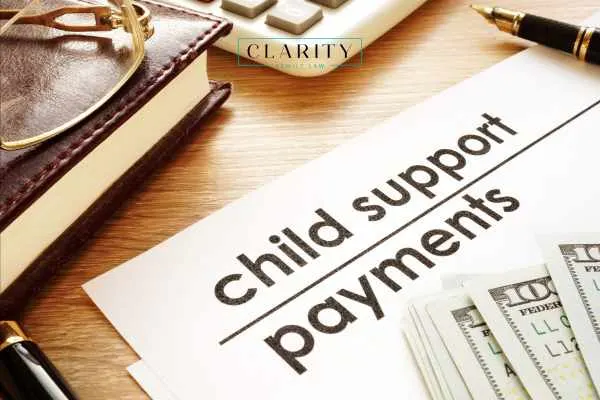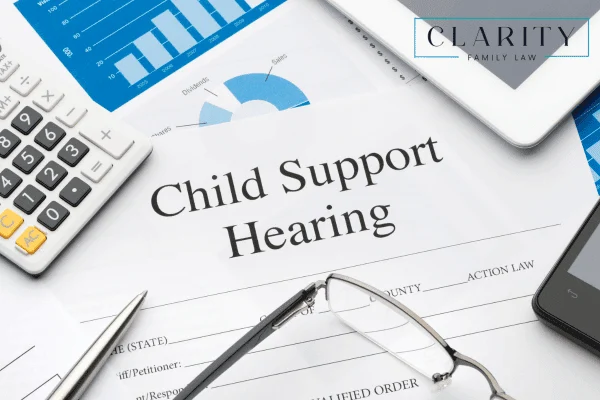Child support enforcement in Michigan is not informal, negotiable, or optional. Once the court enters a child support obligation, it becomes a legally binding order backed by state and federal enforcement authority. When payments are missed, enforcement begins automatically through administrative systems, court procedures, and, in serious cases, criminal prosecution.
Understanding how Michigan’s child support enforcement system works is essential for parents facing arrears, enforcement actions, or court involvement. In these situations, guidance from a child support attorney can be critical to protecting your rights while navigating a system designed to prioritize financial stability for minors and ensure consistent enforcement regardless of parental conflict.
The Legal Foundation of Child Support Enforcement in Michigan
Child support enforcement in Michigan is governed by a combination of state and federal law, ensuring that support orders remain enforceable across counties, state lines, and income sources.
At the federal level, enforcement authority comes from Title IV-D of the Social Security Act, which authorizes states to operate child support enforcement programs using federal funding and nationwide collection tools. Michigan’s participation in the Federal IV-D program allows enforcement to extend beyond local courts into interstate and federal systems.
At the state level, enforcement is driven by the Family Support Act, the Support and Parenting Time Enforcement Act, and the Child Custody Act of 1970. These statutes make clear that child support is a court-ordered legal obligation, not a private agreement, and remains enforceable until formally modified or terminated by the court.
Learn More: How Can You Change a Child Support Order in Michigan?
Who Handles Child Support Enforcement in Michigan?
Child support enforcement in Michigan operates through a coordinated, multi-agency system. Each agency has a defined role, allowing enforcement actions to escalate efficiently when support payments are missed.
Administrative enforcement is handled by state agencies. Civil enforcement occurs through the circuit courts. Criminal enforcement may involve local prosecutors or the Michigan Attorney General’s office in severe cases. This structure ensures enforcement proceeds automatically, without requiring repeated action by the custodial parent.
Michigan Department of Health and Human Services (MDHHS)
The Michigan Department of Health and Human Services (MDHHS) is the primary agency responsible for child support enforcement statewide. Through its Office of Child Support Services, MDHHS administers the Michigan Child Support Enforcement System, which tracks support orders, payments, arrearages, and enforcement actions.
MDHHS enforces support obligations through administrative authority and court coordination, including:
- Issuing income withholding orders
- Initiating state and federal tax intercepts
- Reporting delinquent accounts to credit bureaus
- Coordinating interstate enforcement
- Managing payment distribution through the Michigan State Disbursement Unit
Title IV-D cases enable MDHHS to operate under U.S. DHHS authority. A case manager handles enforcement, employer communication, and escalation coordination.
Friend of the Court and Circuit Courts
The Friend of the Court (FOC) enforces child support locally by maintaining records, monitoring compliance, processing motions, and scheduling hearings. If administrative action fails, the circuit court can issue contempt orders, bench warrants, and jail sanctions, ensuring mandatory enforcement.
Prosecutors and the Michigan Attorney General
In cases involving persistent nonpayment, significant arrearages, or repeated violations of court orders, enforcement may escalate to criminal prosecution. Local prosecutors and, in some cases, the Michigan Attorney General’s office may pursue felony non-support charges.
This layered enforcement system allows Michigan to respond proportionally, using administrative tools for routine enforcement and criminal penalties when noncompliance becomes willful and severe.

How Child Support Enforcement Begins in Michigan
Child support enforcement in Michigan begins automatically when a payment is missed. It does not require action by the custodial parent.
When a support obligation is set via divorce, paternity, or custody cases, it’s monitored by the Michigan Child Support Enforcement System. Payments go through the Michigan State Disbursement Unit, with missed payments flagged immediately for administrative enforcement. The state sends warning letters, checks income through New Hire Reporting, and reviews employer records. Continued nonpayment results in arrears, noted by the Friend of the Court, and escalates enforcement.
Parenting time disputes do not affect enforcement. Under Michigan law, child support and parenting time are enforced separately, and withholding support is never permitted.
Learn More: How to Enforce Child Support Out of State
Administrative Child Support Enforcement Tools (Before Court Action)
Michigan relies heavily on administrative enforcement tools to compel compliance before court intervention becomes necessary. These tools operate automatically and are difficult to avoid.
Income Withholding Orders
Income withholding orders are key to enforcing child support. Employers directly deduct payments from wages and send them to the state. These orders also apply to unemployment benefits, workers’ comp, and some Social Security benefits.
Withholding limits are governed by the Federal Consumer Credit Protection Act. Interstate income withholding orders may also be issued when a parent works outside Michigan.
Tax Intercepts and Government Offsets
When arrearages reach statutory thresholds, Michigan may initiate tax intercepts. This includes interception of federal returns and state income tax returns once the federal past-due threshold is met. These intercepts occur automatically and are often used to recover large balances.
Credit Bureau Reporting
Delinquent accounts are reported to consumer credit reporting agencies through credit bureau reporting. Once reported, the delinquency can affect credit for years, impacting loans, housing, and employment. This enforcement tool requires no court hearing and often begins early.
License Suspension
Michigan may suspend driver’s licenses, professional licenses, and recreational or sporting licenses when support arrearages reach required levels. Reinstatement usually requires payment or court approval. License suspension is designed to create immediate compliance pressure without court involvement.

Court Enforcement: Motions to Show Cause and Hearings
When administrative enforcement tools fail to secure compliance, child support enforcement moves into the court system. This phase involves direct judicial oversight and significantly higher consequences.
Court enforcement typically begins with a Motion to Show Cause, also called an Order to Show Cause (OTSC). This filing requires the non-paying parent to appear before a circuit court judge and explain why they should not be held in contempt for violating a valid support order. The responsibility rests entirely on the parent who failed to pay.
At an OTSC hearing, the court reviews:
- The support obligation and payment history
- The Friend of the Court record
- Evidence of ability to pay
- Prior enforcement actions
- Any claimed defenses or financial changes
If nonpayment is deemed willful, the court may find contempt and impose sanctions, like enforced payment plans, fines, or jail. Missing court dates can lead to bench warrants. Court action is mandatory once arrears exist and a motion is filed.
Criminal Enforcement and Felony Non-Support
In the most serious cases, Michigan law permits criminal prosecution for child support violations. Felony non-support applies when a parent knowingly and repeatedly fails to meet their support obligation despite enforcement efforts and court orders.
Felony non-support charges are typically pursued when:
- Arrearages are substantial
- Prior contempt orders have failed
- The parent has the ability to pay, but refuses
- Enforcement orders are repeatedly ignored
Criminal cases may be prosecuted by local prosecutors, the Michigan Attorney General’s office, or designated child support enforcement units operating under federal Title IV-D authority. Convictions can result in arrest warrants, jail or prison sentences, probation, and long-term legal consequences.
Felony non-support charges also create permanent criminal records, affecting employment, housing, and professional licensing. These cases underscore a fundamental legal principle in Michigan: child support enforcement is not optional, and prolonged noncompliance carries criminal risk.

Credit Reporting and Long-Term Financial Consequences
Child support enforcement in Michigan extends beyond the courtroom and into a parent’s long-term financial record. When support arrearages reach reporting thresholds, delinquent accounts may be reported to a consumer credit reporting agency through credit bureau reporting.
Once reported, unpaid child support can negatively affect:
- Credit scores
- Loan and mortgage eligibility
- Rental applications
- Employment background checks
Unlike other debts, child support arrears are not easily removed from credit reports and may remain even after payment is made. This makes early intervention critical. Credit reporting is designed to apply sustained pressure until compliance is achieved, not merely to collect past-due amounts.
Why Legal Representation Matters in Enforcement Cases
Child support enforcement moves quickly and escalates without warning. Once enforcement begins, parents may face wage garnishment, license suspension, show cause hearings, or criminal exposure with little time to respond.
A qualified family law attorney can:
- Review enforcement notices and FOC records
- Challenge improper income calculations
- Address arrearage disputes
- Represent clients at OTSC hearings
- Seek modification when legally justified
Attempting to navigate enforcement alone often worsens outcomes. Strategic legal intervention can prevent unnecessary penalties and protect long-term rights.

Legal Guidance When Child Support Is Being Enforced
Child support enforcement in Michigan is a serious legal process backed by court authority, law enforcement, and federal enforcement systems. Ignoring notices or delaying action only increases financial and legal risk.
Clarity Law Firm represents parents throughout Michigan in child support enforcement matters. We understand how MDHHS, the Friend of the Court, and the circuit courts operate, and we know how to respond decisively.
Contact Clarity Law Firm today at (313) 513-1919 to address enforcement actions, protect your rights, and regain control of your case. Waiting only limits your options.
